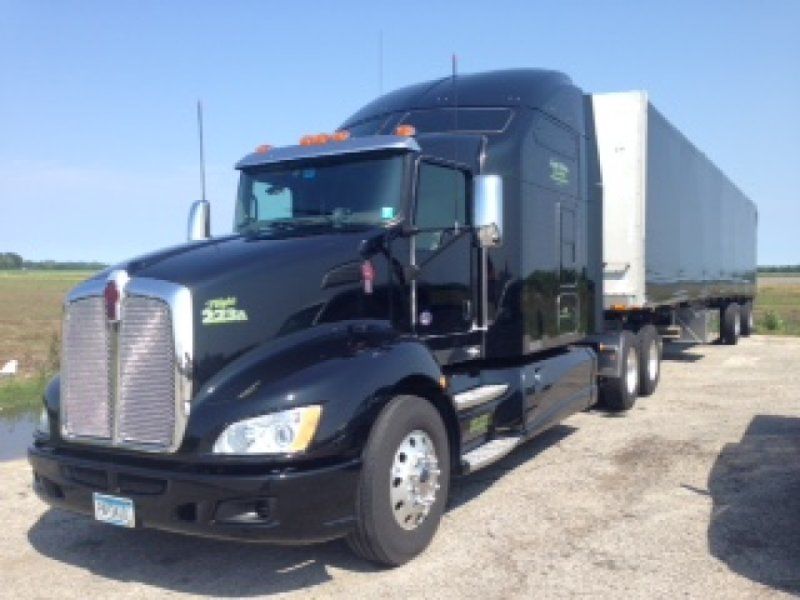Con-Way Freight
Topic 4636 | Page 1

I would do some more research on this. I haven't, but I don't think this is exactly correct. Joplin is where CFI (Contract Freighters Inc.) was from, a company that Con-Way bought, and it became Con-Way Truckload, several years later, you still see CFI trailers being pulled by Con-Way tractors. Con-Way Freight is the LTL portion of the company. They are headquartered in Ann Arbor Michigan. I used to drive for them (Con-Way Central Express). But I do think they hire without a CDL , but I think they do it at all of their LTL Terminals, not just one. You have to find a job listing for Driver-Student. Here is a description I found:
The Con-way Freight (LTL) Driver Sales Representative Student (DSR Student)Program is an intensive twelve module training program consisting of classroom education and hands on driving experience. The DSR Student will work as a dock worker for a minimum of 30 days prior to the start of classroom training. There is up to 90 days of classroom training in the program. If successfully completed, the DSR Student will be eligible to test to obtain a Commercial Drivers License with hazardous materials endorsements and doubles/triples endorsements, and upon meeting all other company requirements the DSR Student may be eligible to be offered a Driver/Sales Representative position.
Driver/Sales Rep is what their drivers are called, due to all of the contact the driver has with the customers, you act as a sort of sales rep also. Check out their website under careers. They have options such as start out on the road with Truckload, then you can transfer to LTL.
CDL:
Commercial Driver's License (CDL)
A CDL is required to drive any of the following vehicles:
- Any combination of vehicles with a gross combined weight rating (GCWR) of 26,001 or more pounds, providing the gross vehicle weight rating (GVWR) of the vehicle being towed is in excess of 10,000 pounds.
- Any single vehicle with a GVWR of 26,001 or more pounds, or any such vehicle towing another not in excess of 10,000 pounds.
- Any vehicle, regardless of size, designed to transport 16 or more persons, including the driver.
- Any vehicle required by federal regulations to be placarded while transporting hazardous materials.
Terminal:
A facility where trucking companies operate out of, or their "home base" if you will. A lot of major companies have multiple terminals around the country which usually consist of the main office building, a drop lot for trailers, and sometimes a repair shop and wash facilities.
LTL:
Less Than Truckload
Refers to carriers that make a lot of smaller pickups and deliveries for multiple customers as opposed to hauling one big load of freight for one customer. This type of hauling is normally done by companies with terminals scattered throughout the country where freight is sorted before being moved on to its destination.
LTL carriers include:
- FedEx Freight
- Con-way
- YRC Freight
- UPS
- Old Dominion
- Estes
- Yellow-Roadway
- ABF Freight
- R+L Carrier
Doubles:
Refers to pulling two trailers at the same time, otherwise known as "pups" or "pup trailers" because they're only about 28 feet long. However there are some states that allow doubles that are each 48 feet in length.

I'm sorry Tailgunner, you are slightly incorrect. Drake if you have of heard of this driver training program you are correct. I do not believe that these driver-trainees are hired specifically for this program and for the purpose of this program, however if one is a dockworker already, one can apply for the 12-week training program. I will double-check on that in the morning and ask these guys themselves. Right now, they are being paid as dockworkers and have signed a one-year contract to drive for Con-way upon completion of the program. At that point, their pay will jump by $6.00 per hour to be paid as new drivers. It is happening alongside the program under which I was hired and just started as a newly licensed commercial driver. At my terminal in Henderson, CO, there are two programs in operation as we speak. Mine is 5 weeks for CDL drivers, of which there are 2 of us. It's extremely selective and only funded by corporate when they believe it is cost effective. The last 5-week course for new drivers, at my terminal was earlier this year, in January or February and was cancelled by Ann Arbor Headquarters right afterwards. Later this year, Headquarters decided to start the program again, and that's the 5-week program that I'm in. The 12-week program is great too. There are 4-6 guys in that one and these guys are working hard but they are going to be gooood once they're done. They've all been working on the dock for a while (we have about 120 doors on our dock). From 6:00am-10:00am they drive either on the skills course or on the road with an instructor and from 10:30 or 11:00 am until the end of their day, they work on the dock. They must pass their CDL in the 7th week so that they can finish the program driving on runs, either with other non-instructor drivers or on their own. By that time, they must also have their doubles/triples, hazmat. We drive mostly pups as doubles triples out of Henderson.
Long day. Gotta' sleep.
-mountain girl
CDL:
Commercial Driver's License (CDL)
A CDL is required to drive any of the following vehicles:
- Any combination of vehicles with a gross combined weight rating (GCWR) of 26,001 or more pounds, providing the gross vehicle weight rating (GVWR) of the vehicle being towed is in excess of 10,000 pounds.
- Any single vehicle with a GVWR of 26,001 or more pounds, or any such vehicle towing another not in excess of 10,000 pounds.
- Any vehicle, regardless of size, designed to transport 16 or more persons, including the driver.
- Any vehicle required by federal regulations to be placarded while transporting hazardous materials.
HAZMAT:
Hazardous Materials
Explosive, flammable, poisonous or otherwise potentially dangerous cargo. Large amounts of especially hazardous cargo are required to be placarded under HAZMAT regulations
Terminal:
A facility where trucking companies operate out of, or their "home base" if you will. A lot of major companies have multiple terminals around the country which usually consist of the main office building, a drop lot for trailers, and sometimes a repair shop and wash facilities.
Doubles:
Refers to pulling two trailers at the same time, otherwise known as "pups" or "pup trailers" because they're only about 28 feet long. However there are some states that allow doubles that are each 48 feet in length.

The dockworkers in the 12-week driver training program are either hired specifically for this or are accepted into the program if they are already dockworkers and want to start driver training. If they are hired directly into the 12-week program, they have to work a minimum of 90 days before they can start the 12 weeks of driver training. When they finish the 90 days plus the 12-week program, their pay goes up to the new driver minimum which is about a $6.00/hr raise for them.
And yes, when they're done, they are DSRs, Driver Sales Reps.
They're calling my program the "new driver 5-week crash course," at my terminal and this course does not happen at every terminal like the 12-week one does. We will also be DSRs when we're done.
Having said all that:
If I were to choose between getting my CDL at a private school and getting it through Con-way Freight, there is no doubt in my mind what-so-ever, that the 12-week-ers learning from the ground up at Con-way have a better program. Hands down. No questions asked.
Yes, they're tired but the training they're getting is from drivers who are still running loads and still in the business. I learned from a bunch of guys who only work for the school I went to, have out-dated opinions on a lot of things, and I'm having to re-learn so many things the way these guys at Con-way teach it (I'm grateful, because they're better but it would have been way simpler and easier to learn from them first rather than having to break bad habits from old teachers with bad habits....arg!) Granted, I learned a lot at the school, but these Con-way drivers are the cream-of-the-crop and I feel really fortunate because I know, in 4 more weeks, I am going to be soooooo much better at driving ... ...because of them. They're grilling me while on the road, making me shift smoothly, forcing me to verbalize and justify my every move, my every shift, my every reason to shift, my every reason to not shift, and teaching me the refinement I really, really want in order to be a great, safe driver. I am lovin' it. The dock-worker/driver trainees in the 12-week course, who will have their CDLs in two weeks plus for more weeks in the program after that, are probably already better at it than I am and as I've told them: they're going to smoke that CDL skills test because the standards at this Con-way Freight terminal where I am are soooo much higher.
-mountain girl

CDL:
Commercial Driver's License (CDL)
A CDL is required to drive any of the following vehicles:
- Any combination of vehicles with a gross combined weight rating (GCWR) of 26,001 or more pounds, providing the gross vehicle weight rating (GVWR) of the vehicle being towed is in excess of 10,000 pounds.
- Any single vehicle with a GVWR of 26,001 or more pounds, or any such vehicle towing another not in excess of 10,000 pounds.
- Any vehicle, regardless of size, designed to transport 16 or more persons, including the driver.
- Any vehicle required by federal regulations to be placarded while transporting hazardous materials.
Terminal:
A facility where trucking companies operate out of, or their "home base" if you will. A lot of major companies have multiple terminals around the country which usually consist of the main office building, a drop lot for trailers, and sometimes a repair shop and wash facilities.
OOS:
When a violation by either a driver or company is confirmed, an out-of-service order removes either the driver or the vehicle from the roadway until the violation is corrected.

They're calling my program the "new driver 5-week crash course," at my terminal and this course does not happen at every terminal like the 12-week one does. We will also be DSRs when we're done.
-mountain girl
Probably not the greatest choice of names for a CDL training course. May want to skip the day of the "crash".

CDL:
Commercial Driver's License (CDL)
A CDL is required to drive any of the following vehicles:
- Any combination of vehicles with a gross combined weight rating (GCWR) of 26,001 or more pounds, providing the gross vehicle weight rating (GVWR) of the vehicle being towed is in excess of 10,000 pounds.
- Any single vehicle with a GVWR of 26,001 or more pounds, or any such vehicle towing another not in excess of 10,000 pounds.
- Any vehicle, regardless of size, designed to transport 16 or more persons, including the driver.
- Any vehicle required by federal regulations to be placarded while transporting hazardous materials.
Terminal:
A facility where trucking companies operate out of, or their "home base" if you will. A lot of major companies have multiple terminals around the country which usually consist of the main office building, a drop lot for trailers, and sometimes a repair shop and wash facilities.

Probably not the greatest choice of names for a CDL training course. May want to skip the day of the "crash".
-Sandman
Oh, that is SOO funny! That's the new driver course for the company, for drivers who already have their CDL. Nevertheless, it's their slang term for it, but I will point that out, first thing in the morning and put a stop to it immediately. ROTFL! I must be tired, if I didn't even pick up on that till you said something! LMAO.
-mountain girl


CDL:
Commercial Driver's License (CDL)
A CDL is required to drive any of the following vehicles:
- Any combination of vehicles with a gross combined weight rating (GCWR) of 26,001 or more pounds, providing the gross vehicle weight rating (GVWR) of the vehicle being towed is in excess of 10,000 pounds.
- Any single vehicle with a GVWR of 26,001 or more pounds, or any such vehicle towing another not in excess of 10,000 pounds.
- Any vehicle, regardless of size, designed to transport 16 or more persons, including the driver.
- Any vehicle required by federal regulations to be placarded while transporting hazardous materials.
Dm:
Dispatcher, Fleet Manager, Driver Manager
The primary person a driver communicates with at his/her company. A dispatcher can play many roles, depending on the company's structure. Dispatchers may assign freight, file requests for home time, relay messages between the driver and management, inform customer service of any delays, change appointment times, and report information to the load planners.New Reply:
New! Check out our help videos for a better understanding of our forum features

















Preview:








 TT On Facebook
TT On Facebook
You have a list of company sponsored CDL schools on you website. They are very interesting.
However, there is a school that you should add to that list which is Con-Way Freight. They have a unique program, because the student earns income while schooling and training. The student is hired as a dockworker. He or she has to work as a dockworker for a while and then starts the CDL school. The student already needs to have the Permit including Hazmat and Double/Triple Endorsements. The schooling is somewhere in Missouri. I think Joplin.
It is an LTL Company.
I am wondering if you want to make analysis of this program like you did with the other companies.
CDL:
Commercial Driver's License (CDL)
A CDL is required to drive any of the following vehicles:
HAZMAT:
Hazardous Materials
Explosive, flammable, poisonous or otherwise potentially dangerous cargo. Large amounts of especially hazardous cargo are required to be placarded under HAZMAT regulations
LTL:
Less Than Truckload
Refers to carriers that make a lot of smaller pickups and deliveries for multiple customers as opposed to hauling one big load of freight for one customer. This type of hauling is normally done by companies with terminals scattered throughout the country where freight is sorted before being moved on to its destination.
LTL carriers include: